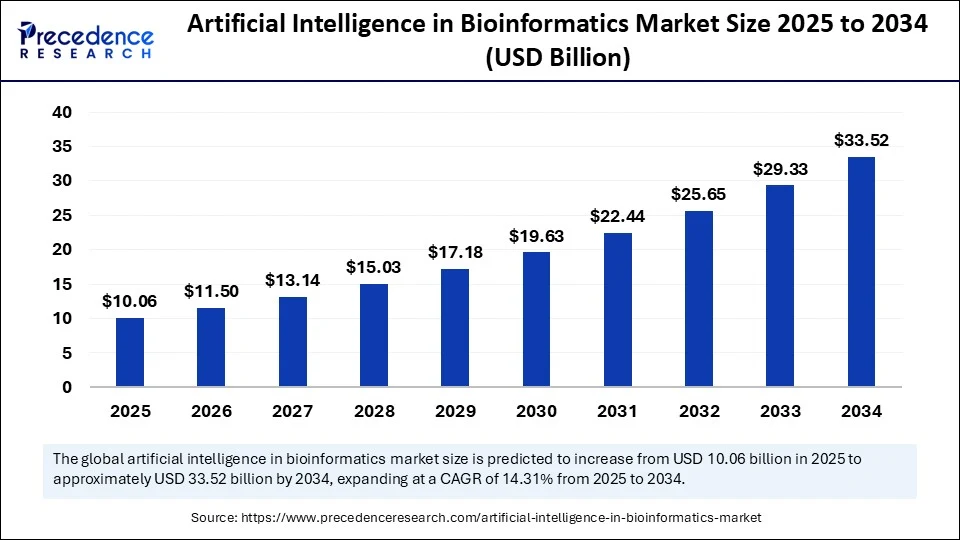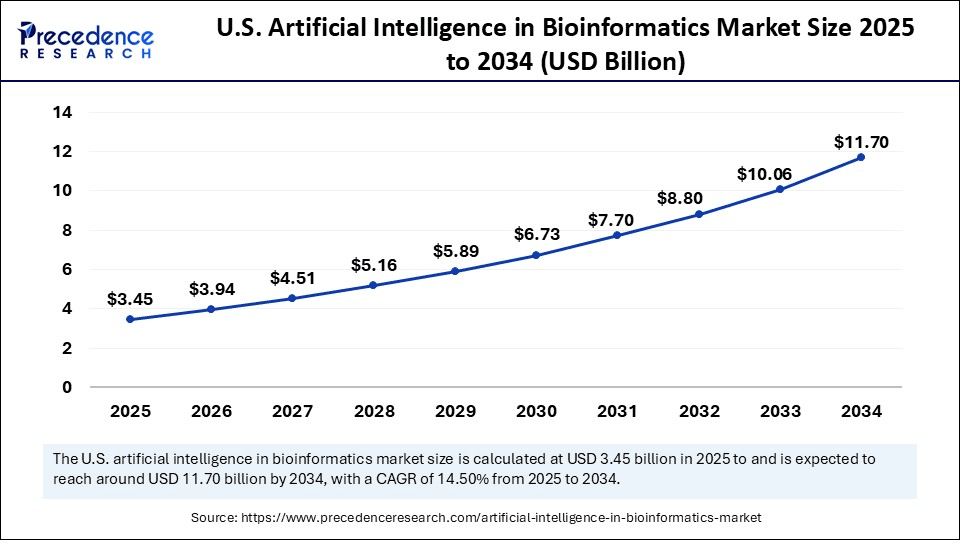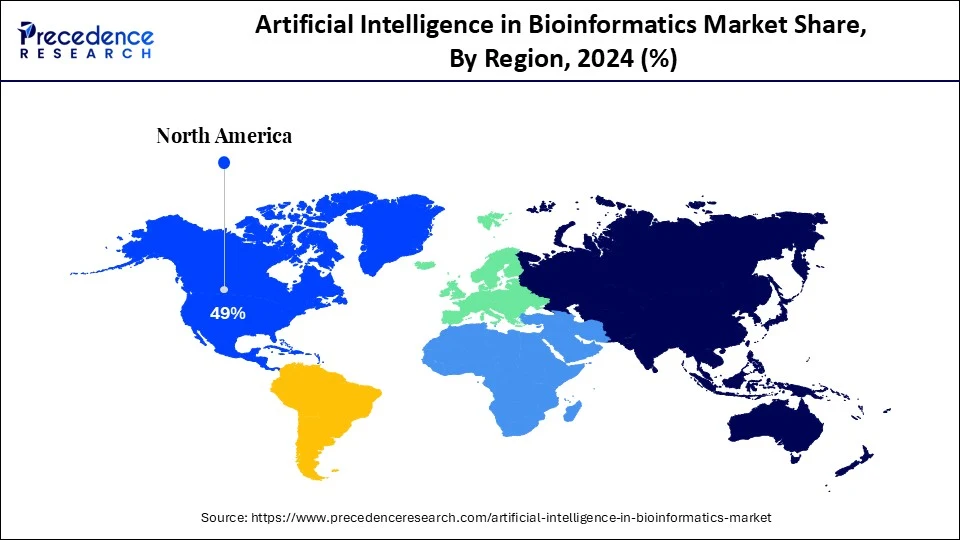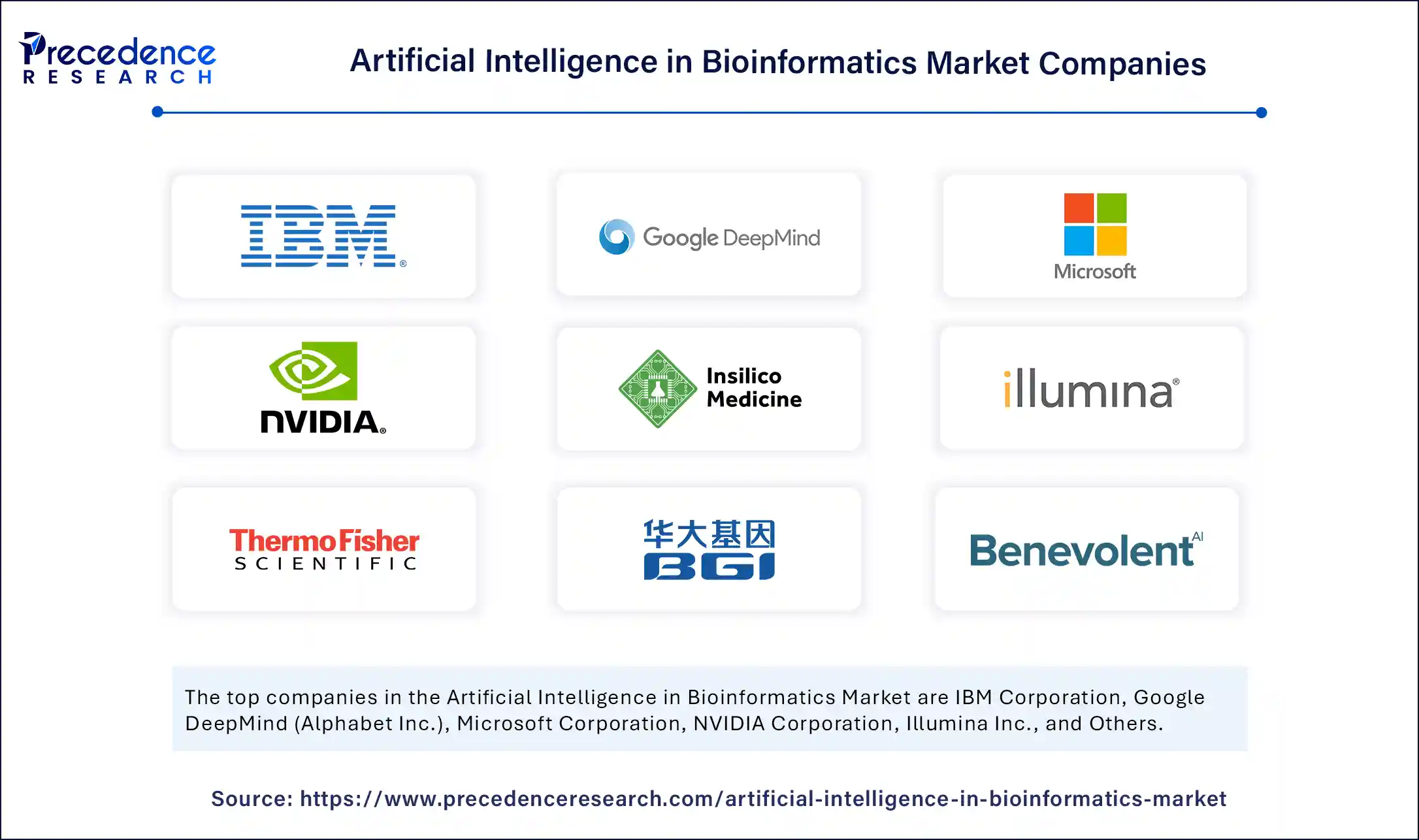Artificial Intelligence in Bioinformatics Market Size and Forecast 2025 to 2034
The global artificial intelligence in bioinformatics market size was calculated at USD 8.80 billion in 2024 and is predicted to increase from USD 10.06 billion in 2025 to approximately USD 33.52 billion by 2034, expanding at a CAGR of 14.31% from 2025 to 2034. The increased demand for personalized medicines is driving the growth of the artificial intelligence in bioinformatics market. Rising investments in drug discovery & development further contributes to market growth.

Artificial Intelligence in Bioinformatics Market Key Takeaways
- In terms of revenue, the global artificial intelligence in bioinformatics market was valued at USD 8.80 billion in 2024.
- It is projected to reach USD 33.52 billion by 2034.
- The market is expected to grow at a CAGR of 14.31% from 2025 to 2034.
- North America dominated the artificial intelligence in bioinformatics market with the largest market share of 49% in 2024.
- Asia Pacific is expected to grow at the highest CAGR from 2025 to 2034.
- By offering, the software segment captured the biggest market share of 41% in 2024.
- By offering, the services segment is expected to expand at a significant CAGR between 2025 and 2034.
- By technology, the machine learning segment led the market, under which the supervised learning sub-segment held a 38% share in 2024.
- By technology, the deep learning segment will grow at a significant CAGR between 2025 and 2034.
- By application, the genomics segment dominated the market, under which the gene sequencing & annotation sub-segment held a 34% share in 2024.
- By application, the drug discovery & development segment will expand at a significant CAGR between 2025 and 2034.
- By end-user, the pharmaceutical & biotechnology companies segment contributed the highest market share of 46% in 2024.
- By end-user, the healthcare providers segment is expected to expand at the fastest CAGR between 2025 and 2034.
U.S. Artificial Intelligence in Bioinformatics Market Size and Growth 2025 to 2034
The U.S. artificial intelligence in bioinformatics market size was exhibited at USD 3.02 billion in 2024 and is projected to be worth around USD 11.70 billion by 2034, growing at a CAGR of 14.50% from 2025 to 2034.

What Made North America the Dominant Region in the Artificial Intelligence in Bioinformatics Market in 2024?
North America dominated the artificial intelligence in bioinformatics market in 2024, driven by its robust technological infrastructure, a strong presence of key market players, a well-established healthcare and life sciences industry, and significant investments in AI research and development. Strong technological infrastructure enabling the adoption and development of sophisticated AI-driven bioinformatics solutions integration. The growing advancements in AI and machine learning, the increasing demand for precision medicine, and the rising volume of data are driving the adoption of AI-powered bioinformatic tools. North America has witnessed significant investments in AI research and development, resulting in innovative approaches in bioinformatics.
The U.S. is a major contributor to the market, driven by its well-established healthcare infrastructure and government support. The adoption of AI in healthcare has increased, driving growth in the U.S. AI in bioinformatics market. The growing demand for personalized medicine is further driving emphasis on AI adoption. Government initiatives and funding for AI research and development are bringing significant innovations to the emerging market. The strong presence of key market players and collaborative approaches is further contributing to market expansion.

Asia Pacific Artificial Intelligence in Bioinformatics Market Trends
Asia Pacific is expected to grow at the fastest rate in the coming years, driven by the expansion of pharmaceutical and biotechnology companies, as well as government initiatives. Asia Pacific has experienced significant growth in investment for AI research, personalized medicine, genomics, and biotechnology. The demand for personalized medicines has increased, driving the adoption of AI-driven bioinformatics tools in the region's research institutes and healthcare infrastructure. Government support for AI adoption in medical practices is driving market growth.
China is a major player in the regional market. Rising investments in AI research and development, robust pharmaceutical & biotechnology companies, government investments, and increasing efforts in technological advancements are fostering the growth of the market in China. India is emerging as a significant player in the market due to its strong emphasis on the development of AI-driven bioinformatics solutions. Government initiatives and support for technological advancements and the development of AI-driven infrastructure contribute to market growth.
- In July 2025, the Indian Institute of Technology (IIT) Indore collaborated with the Bhupat & Jyoti Mehta Family Foundation (MFF) for the establishment of the Mehta Family School of Sustainability and the Mehta Family School of Biosciences and Biomedical Engineering. Both schools are leaning towards academic and research at the intersection of biology, data, technology, and AI. This move will the India's first Biotech program.(Source: https://www.hindustantimes.com)
Europe Artificial Intelligence in Bioinformatics Market Trends
Europe is a notable player in the global market, driving growth due to its robust research and development sector, innovative healthcare system, and government support. Europe has a robust R&D sector, with a strong emphasis on AI and bioinformatics. The well-established healthcare system with a focus on precision health and personalized medicine contributes to growth. Additionally, the government funding for AI research and development enables innovative approaches in the emerging market. Germany is a major player in the regional market, thanks to its robust pharmaceutical and biotechnology industries and focus on developing AI-driven bioinformatics tools. Rising government initiatives promoting the adoption of AI technologies further support market growth.
Market Overview
Artificial intelligence (AI) in bioinformatics refers to the integration of AI technologies such as machine learning (ML), deep learning (DL), natural language processing (NLP), and neural networks with bioinformatics tools to accelerate and enhance the analysis, interpretation, and prediction of biological data. AI-driven bioinformatics platforms are utilized for genomic sequencing, drug discovery, protein structure prediction, disease modeling, and precision medicine, among other applications. By leveraging large-scale biological datasets, AI enables faster hypothesis generation, more accurate predictions, and scalable insights across clinical, pharmaceutical, and academic research domains.
Ongoing advancements in AI and machine learning algorithms enable researchers to analyze vast amounts of biological data with greater speed and accuracy, detect potential patterns, and predict results, leveraging innovative approaches for AI-driven bioinformatics. Additionally, integration of AI with cloud computing to achieve scalable data analysis and democratizing access to state-of-the-art AI tools are forefront innovations. Ongoing initiatives by pharmaceutical and biotech companies to introduce novel and innovative capabilities for AI-driven bioinformatics are driving market growth.
What are the Key Trends in the Artificial Intelligence in Bioinformatics Market?
- Complexity of Biological Data Analysis: The growing complexity of biological data analysis is driven by the rapidly expanding multi-omics data requirements in advanced analytical platforms, which drive a demand for AI in bioinformatics.
- Growing Adoption of Precision Medicine: The adoption of precision medicine has increased, driving demand for sophisticated AI-enabled bioinformatics tools to enhance treatments tailored to individual patients' unique genetic makeup, environment, and lifestyle.
- Adoption of Personalized Medicine: The growing adoption of personalized medicine has increased the emphasis on AI in bioinformatics for analyzing a broad amount of patient data to identify tailored patterns and develop patient-specific treatment plans.
- R&D Spending: Pharmaceutical and biotechnology companies are investing heavily in AI-enabled tools, including in bioinformatics, for seamless data discovery and development.
- Government Initiatives: Governments worldwide are creating various funding opportunities for genomic projects and public-private partnerships that support the adoption of AI in bioinformatics.
Market Scope
| Report Coverage | Details |
| Market Size by 2034 | USD 33.52 Billion |
| Market Size in 2025 | USD 10.06 Billion |
| Market Size in 2024 | USD 8.80 Billion |
| Market Growth Rate from 2025 to 2034 | CAGR of 14.31% |
| Dominating Region | North America |
| Fastest Growing Region | Asia Pacific |
| Base Year | 2024 |
| Forecast Period | 2025 to 2034 |
| Segments Covered | Offering, Technology, Application, End User, and Region |
| Regions Covered | North America, Europe, Asia-Pacific, Latin America, and Middle East & Africa |
Market Dynamics
Drivers
Growing Volume of Biological Data
The increased volume of biological data is driving the need for sophisticated analysis and interpretation tools. The growth in omics data, including genomics, proteomics, metabolomics, and transcriptomics, is driving demand for comprehensive computational tools and the integration of algorithms for data analysis and interpretation. Technological advancements, such as high-throughput sequencing technologies, are revolutionizing the genomic field and generating a vast amount of data, thereby driving the need for AI tools in data analysis and interpretation. Additionally, the complexity of biological systems makes AI-driven tools essential for analyzing and modeling the interactions between various biological components. AI plays a crucial role in identifying patterns in vast biological datasets.
Restraint
Data Security and Privacy Concerns
Biological data, such as proteomic and genomic data, are highly sensitive and require high privacy and security. Sensitive biological data is at high risk of data breaches due to unauthorized access, which can compromise patient confidentiality and trust. The complexity of data sharing in bioinformatics research further increases the risk of data breaches and data security concerns. Additionally, strict regulations regarding data security and privacy, like GDPR and HIPAA, require biotech companies to handle bioinformatic research.
Opportunity
Growing Demand for Integrated Solutions
The demand for integrated solutions has increased the research and development sector due to the rising need for holistic analysis and the interpretation of complex biological data from various sources. Researchers are focusing on integrating multi-omics data from multiple sources to gain a tailored understanding of biological systems and disease mechanisms. Integrated solutions provide seamless workflows, automate repetitive tasks, and enable researchers to focus on higher-level analysis and interpretation. Ongoing collaborations between researchers, industrial professionals, and clinicians in the innovation and discovery of novel treatments and drugs are further contributing to the requirement for integrated solutions.
Offering Insights
What Made Software the Dominant Segment in the Artificial Intelligence in Bioinformatics Market in 2024?
The software segment dominated the market in 2024. This is mainly due to the increased adoption of AI-based software for analyzing the largest amount of biological data. The ability of AI-powered software to handle complex data and provide insights is increasing in popularity in the market. The software includes AI algorithms, platforms & suites, APIs & toolkits, custom AI models, etc. The AI platforms & suites sub-segment held the largest share of the market in 2024. This is mainly due to their ability to handle complex biological data and automate data interpretation. The adoption of AI platforms and suites is increasing in research and clinical applications, including variant analysis, drug discovery, and gene sequencing.
The services segment is expected to grow at the fastest CAGR in the coming years, driven by the increasing adoption and implementation of AI-driven bioinformatics solutions. Services include the development of algorithms for specific Biome formatting applications, data analysis and interpretation, as well as consulting and support to optimize their use of AI-driven bioinformatics tools. Services include data annotation & curation, model training & validation, consulting & implementation, managed services, and others. The model training & validation sub-segment is growing rapidly due to the increasing need for specialized knowledge and expertise in the development and deployment of AI solutions in bioinformatics. Model training and validation services are essential in algorithm development, data analysis, AI implementation, and model training.
Technology Insights
Why Did the Machine Learning Segment Dominate the Artificial Intelligence in Bioinformatics Market in 2024?
The machine learning segment dominated the market in 2024 due to its crucial role in analyzing complex biological data, accelerating drug discovery, and enhancing the development of personalized medicines. Machine learning algorithms play a vital role in pattern recognition, predictive modeling, data analysis, and enhancing the accuracy of bioinformatics analysis. The supervised learning sub-segment held the largest share of the market in 2024, driven by its key role in drug discovery, personalized medicine, and genomic data analysis. Supervised learning enables predictive modeling, enhances accuracy, and can be trained on labeled data.
The deep learning segment is expected to grow at the fastest rate over the forecast period due to its crucial role in analyzing complex biological data. Deep learning is essential for high-dimensional data analysis, including modeling biological systems and image recognition. The generative adversarial networks (GANs) sub-segment is leading the charge, driven by their ability to create realistic data. Generative adversarial networks (GANs) are being rapidly applied in various fields, including the generation of synthetic biological data, the enhancement of AI model training for medical images, and the expansion of chemical space for drug candidates.
Application Insights
How Does the Genomics Segment Dominate the Artificial Intelligence in Bioinformatics Market in 2024?
The genomics segment led the market, under which the gene sequencing & annotation sub-segment held a significant share in 2024. This is primarily due to the increased use of artificial intelligence (AI) to analyze vast amounts of genomic data, which is essential for precision medicine, accelerating drug discovery, and predicting disease risk. AI is rapidly transforming areas like genome analysis, sequencing, and interpretation. The integration of next-generation sequencing & annotation enables scalable, quick, and accurate analysis of genomics data.
The drug discovery & development segment is likely to grow at the fastest CAGR in the upcoming period, driven by the rising adoption of AI in drug discovery & development for increased efficiency, accuracy, and success rates, as well as reduced cost burdens. The demand for novel and innovative medicines and therapeutics has increased, driving the integration of AI algorithms in drug discovery & development applications. Under the drug discovery & developments segment, the target identification sub-segment is leading the charge, driven by the crucial role of AI, which accelerates drug discovery by analyzing a broad amount of data to identify potential therapeutic targets. AI enables the detection of drug targets and the prediction of the safety and efficacy of potential candidates.
End-User Insights
Why Did the Pharmaceutical & Biotechnology Companies Segment Dominate the Artificial Intelligence in Bioinformatics Market in 2024?
The pharmaceutical & biotechnology companies segment dominated the market while holding the largest share in 2024 due to increased adoption of AI in drug discovery, personalized medicine, and streamlining clinical trials. Pharmaceutical and biotechnological companies are integrating AI into their drug discovery and development processes to reduce downtime and cost burdens. AI-driven bioinformatics tools play a crucial role in accelerating the research and development process. The growing demand for personalized medicine, combined with the need to improve precision in targeting specific diseases and achieve enhanced success rates, is prompting pharmaceutical and biotechnology companies to adapt AI-driven bioinformatics solutions.
The healthcare providers segment is expected to grow at the fastest rate over the forecast period, driven by their strong emphasis on delivering efficient, accurate, and enhanced patient outcomes. The demand for personalized medicines has driven healthcare providers to adapt AI-driven bioinformatic solutions for more accurate and tallied treatment plans. The rising pressure on the healthcare system to improve productivity and reduce costs is a crucial step toward the adoption of AI solutions. Additionally, the increasing adoption of AI in clinical settings for more accurate diagnostics, operational efficiency, and personalized patient care contributed to segment growth.
Artificial Intelligence in Bioinformatics Market Companies

- IBM Corporation
- Google DeepMind (Alphabet Inc.)
- Microsoft Corporation
- NVIDIA Corporation
- Illumina Inc.
- Thermo Fisher Scientific
- BGI Genomics
- BenevolentAI
- Insilico Medicine
- Deep Genomics
- DNAnexus
- Recursion Pharmaceuticals
- PathAI
- Tempus Labs
- Genentech (Roche)
- QIAGEN
- BioAge Labs
- F1000 (Taylor & Francis Group)
- Lifebit
- Cyclica
Recent Developments
- In June 2025, Fauna Bio launched its Fauna Brain, unveiling a bold new model called a multi-agent AI system, which is trained from cross-species omics data for executing research workflows independently.
(Source: https://bridgeinformatics.com) - In May 2025, SIB Swiss Institute of Bioinformatics launched a tool to improve biological discovery by AI and knowledge representation, ExpasyGPT. The tool enables researchers to retrieve and compile information from the SIB database more speed and easily.
(Source: https://www.sib.swiss)
Segment Covered in the Report
By Offering
- Software
- AI Algorithms
- Platforms & Suites
- APIs & Toolkits
- Custom AI Models
- Others
- Services
- Data Annotation & Curation
- Model Training & Validation
- Consulting & Implementation
- Managed Services
- Others
By Technology
- Machine Learning (ML)
- Supervised Learning
- Unsupervised Learning
- Reinforcement Learning
- Deep Learning
- Convolutional Neural Networks (CNNs)
- Recurrent Neural Networks (RNNs)
- Generative Adversarial Networks (GANs)
- Natural Language Processing (NLP)
- Computer Vision
- Others (e.g., Rule-Based Systems, Knowledge Graphs)
By Application
- Genomics
- Gene Sequencing & Annotation
- Variant Calling & Analysis
- Gene Expression Analysis
- Proteomics
- Protein Structure Prediction
- Protein Function Annotation
- Drug Discovery & Development
- Target Identification
- Lead Optimization
- Toxicity Prediction
- Precision Medicine
- Disease Modeling
- Biomarker Discovery
- Systems Biology
- Metabolomics
- Transcriptomics
- Others (e.g., Epigenomics, Microbiomics)
By End User
- Pharmaceutical & Biotechnology Companies
- Academic & Research Institutions
- Healthcare Providers
- CROs & CDMOs
- Government Agencies & Public Health Institutes
- Others (e.g., AI Startups, Tech Companies)
By Region
- North America
- Europe
- Asia Pacific
- Latin America
- Middle East & Africa
 Get a Sample
Get a Sample
 Table Of Content
Table Of Content